Have you ever dreamed of blending your nursing career with a life of adventure? Picture this: one month you’re working in a bustling New York City hospital, and a few months later, you’re caring for patients in sunny California or a quiet Midwest town. That’s the reality for travel nurses.
The demand for travel nurses has skyrocketed in recent years. Hospitals and clinics across the U.S. rely on them to fill temporary staffing shortages. Compared to traditional NP’s, travel nurses enjoy some amazing perks: higher pay, flexible schedules, housing stipends, sign-on bonuses, and, of course.
So, how do you get started? How to become a travel nurse is a question many RNs ask when they feel ready for a change from routine bedside care. The process involves meeting education and licensing requirements.
1. Requirements to Become a Travel Nurse
Before you pack your bags for your first travel assignment, there are a few requirements you’ll need to meet. The good news? If you’re already a working nurse, you may be closer to qualifying than you think. Let’s break it down.
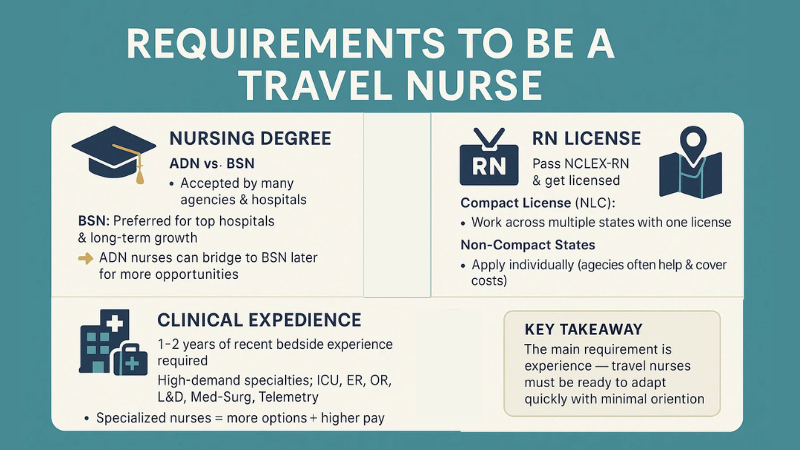
Nursing Degree (ADN vs. BSN)
The very first step is becoming a Registered Nurse (RN). To do that, you’ll need either an Associate Degree in Nursing (ADN) or a Bachelor of Science in Nursing (BSN).
- ADN nurses can absolutely become travel nurses. Many agencies accept them, and plenty of hospitals do too.
- BSN-prepared nurses, however, tend to have a competitive edge. More hospitals — especially large teaching facilities or magnet-status hospitals — prefer or even require BSNs.
If you’re an ADN nurse, don’t worry. You can still start your travel career, but if you’re thinking long-term, consider bridging to a BSN later to unlock more opportunities.
RN License
Once you graduate, the next step is passing the NCLEX-RN exam and securing your nursing license.
Here’s where things get interesting for travel nurses:
- If you live in a Nurse Licensure Compact (NLC) state, you’re in luck. This multi-state license allows you to work in other compact states without reapplying for new licenses each time. That means less paperwork and more flexibility when choosing assignments.
- If your home state isn’t part of the NLC, don’t worry — you can still travel. You’ll just need to apply for and maintain individual state licenses where you want to work. Many agencies help with this process and even cover licensing costs.
Clinical Experience
This is the biggest factor that sets travel nurses apart from new grads. Most agencies and hospitals want nurses who can hit the ground running with minimal orientation. That’s why:
- You’ll usually need at least 1–2 years of recent bedside experience in your specialty.
- High-demand specialties include ICU, ER, OR, L&D, Med-Surg, and Telemetry.
- The more specialized your skills, the more options (and often higher pay) you’ll have.
For example, an ICU nurse with two years of solid experience may find assignments nationwide, while a nurse with only six months on a general floor might need to wait until they gain more practice.
2. How Long Does It Take to Become a Travel Nurse?
If you’re excited about becoming a travel nurse, you might be wondering: “How long will it actually take before I can hit the road?” The answer depends on your education path and how quickly you build experience, but here’s a realistic breakdown:
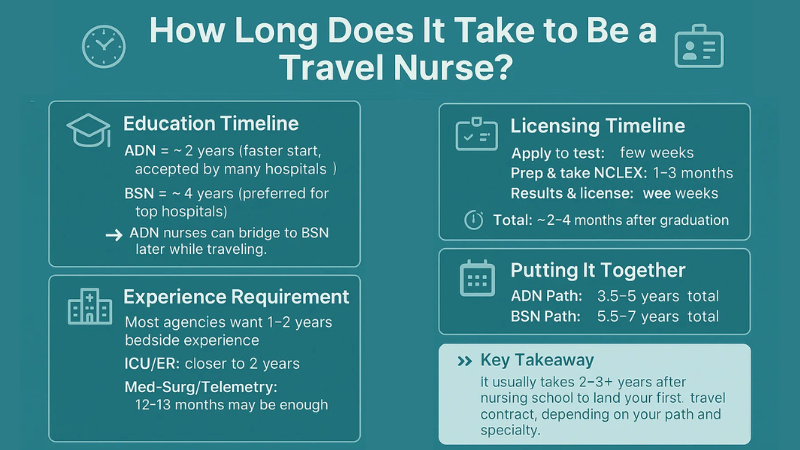
Education Timeline
Your first step is becoming a registered nurse — and your degree choice makes a difference:
- ADN (Associate Degree in Nursing): Typically takes 2 years. This is the faster route to becoming an RN.
- BSN (Bachelor of Science in Nursing): Takes about 4 years. While longer, it often gives you an advantage when applying for travel assignments at larger hospitals or magnet facilities.
Licensing Timeline
Once you graduate, you’ll need to take and pass the NCLEX-RN. The timeline looks like this:
- Applying for authorization to test: a few weeks.
- Scheduling and preparing for the exam: 1–3 months (depending on how quickly you’re ready).
- Waiting for results and receiving your license: usually within a few weeks after passing.
So, budget at least 2–4 months after graduation before you’re fully licensed and ready to work.
Experience Requirement
Here’s where patience really matters. Most travel nursing agencies — and the hospitals they work with — require nurses to have at least 1–2 years of recent bedside experience in a hospital setting. Why? Because travel nurses often get very little orientation and need to be ready to adapt immediately.
- For example, if you’re aiming for ICU or ER travel jobs, expect to need closer to 2 years of solid specialty experience.
- For Med-Surg, Telemetry, or general units, 12–18 months may be enough.
Putting It All Together
- ADN route: ~2 years (school) + 2–4 months (licensing) + 1–2 years (experience) = 5–5 years total before your first travel assignment.
- BSN route: ~4 years (school) + 2–4 months (licensing) + 1–2 years (experience) = 5–7 years total before your first travel assignment.
Bottom line: It usually takes 2–3 years after starting nursing school at a minimum to land your first travel contract — but many nurses take a bit longer depending on their path, specialty, and confidence level.
3. Can New Grads Become Travel Nurses?
This is a big question for many nursing students: “Can I start traveling right after graduation?”
The honest answer: In most cases, no.
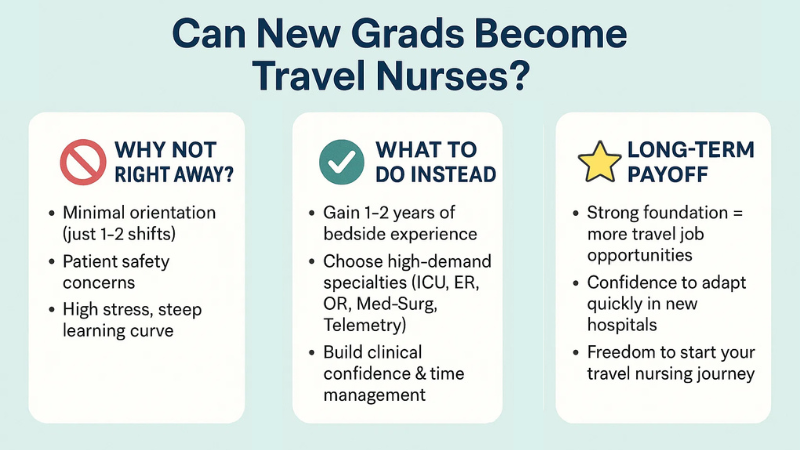
Why Agencies Don’t Hire New Grads
Travel nurses are expected to walk into a new hospital, get a brief orientation (sometimes just 1–2 shifts), and then function independently. That’s a tall order for someone who just graduated.
Here’s why most agencies hesitate:
- Patient safety: Hospitals need travel nurses who can handle emergencies without much guidance.
- Minimal training: Unlike new grad residencies, travel assignments don’t come with months of orientation.
- High stress: The steep learning curve can lead to burnout if you’re still mastering the basics of bedside nursing.
What New Grads Can Do Instead
The good news? Your dream isn’t over — it’s just on pause. Here’s how you can prepare:
- Start strong in a hospital setting. Most travel nurses recommend 1–2 years of bedside experience before your first contract.
- Choose your specialty wisely. High-demand areas like ICU, ER, OR, Telemetry, and Med-Surg are perfect for travel nursing because they’re always needed.
- Build confidence first. Use this time to sharpen clinical judgment, practice time management, and get comfortable with patient loads.
The Long-Term Payoff
Think of it this way: those 1–2 years are an investment in your travel career. Once you’ve built a strong foundation, you’ll not only qualify for travel jobs but also feel confident and capable when stepping into brand-new environments.
4. Steps to Become a Travel Nurse
So, you’ve got your RN license and you’re curious about stepping into the world of travel nursing. Where do you begin? The process can feel overwhelming, but when you break it down into clear steps, it becomes much more manageable. Think of it like preparing for a long trip.
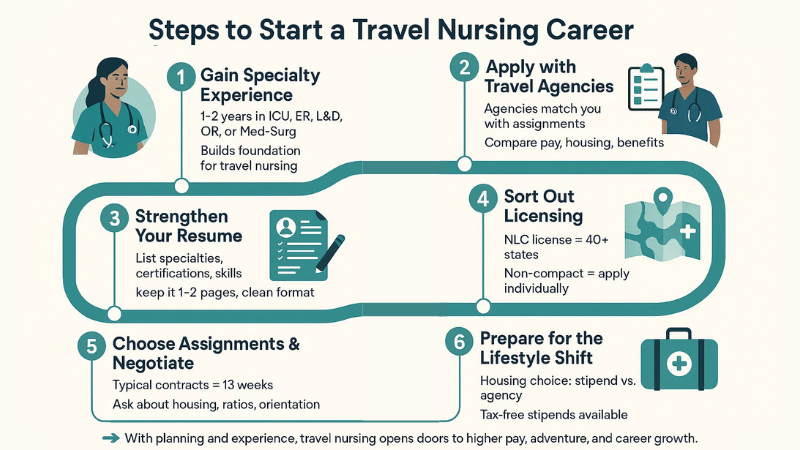
Here’s a step-by-step roadmap to get started:
Step 1: Gain Specialty Experience
Travel nursing isn’t usually an entry-level path. Hospitals bring in travel nurses because they need experienced professionals who can adapt quickly. That means you’ll need some solid bedside experience first.
- How much experience?
Most agencies and hospitals require at least 1–2 years of recent experience in your chosen specialty. Some competitive contracts (like ICU or ER) may want 2+ years. - Which specialties are in demand?
- Critical care (ICU, ER, Trauma): High-paying and always needed.
- Labor & Delivery / NICU: Consistently in demand.
- OR (Operating Room): Specialized skills, great travel opportunities.
- Med-Surg: Flexible option, perfect for nurses who like variety.
Step 2: Apply with Travel Nursing Agencies
Travel nurses don’t usually find jobs directly with hospitals — they work through agencies that match them with open contracts.
- What agencies do for you:
- Find assignments based on your specialty and preferences.
- Negotiate pay packages (hourly rates, overtime, bonuses).
- Help with housing arrangements (free housing vs. stipends).
- Handle licensing, paperwork, and credentialing.
- Choosing an agency:
- Research reviews (some agencies have better reputations than others).
- Sign up with 2–3 agencies at first. This way, you can compare offers and see which recruiters work best for you.
- Look at benefits beyond pay — health insurance, retirement contributions, travel reimbursements, etc.
Step 3: Strengthen Your Resume
Hospitals that hire travel nurses want to know: Can this nurse jump in and handle the job with minimal training?
- What to include on your resume:
- Specialty experience (list exact units you’ve worked in, e.g., MICU, SICU, L&D).
- Certifications: BLS, ACLS, PALS, TNCC (trauma), NRP (neonatal), CCRN (critical care).
- Floating experience (e.g., “Floated to step-down and med-surg units”).
- Concrete skills: “Managed 5–6 high-acuity patients per shift” is more powerful than just “Provided patient care.”
- Formatting matters: Keep it clean, 1–2 pages max, and make sure it’s easy for a hiring manager to scan.
Step 4: Get Your Nursing License Sorted (Compact vs Non-Compact States)
Licensing can feel like a headache, but it’s one of the most important steps.
- Nurse Licensure Compact (NLC):
If you live in a compact state, your single RN license allows you to practice in 40+ states. This makes travel nursing much easier. - Non-compact states:
Don’t worry—you can still travel. You’ll just need to apply for individual state licenses, which can take anywhere from 2 weeks to 3 months depending on the state.
Step 5: Choose Assignments and Negotiate Contracts
This is where things get exciting — and also where new travel nurses sometimes make mistakes.
- How assignments work:
Most contracts are 13 weeks long (about 3 months).- You can extend contracts if you love a hospital, or move on to the next adventure.
- Assignments are available in large teaching hospitals, rural facilities, and everything in between.
- Negotiating your contract:
Don’t just look at the hourly rate. Consider:- Housing: Free agency-provided housing vs. tax-free housing stipend.
- Guaranteed hours: Make sure you’re paid even if shifts are canceled.
- Overtime and shift differentials: Nights and weekends often pay more.
- Travel reimbursements: Gas, flights, and moving costs can add up.
- Questions to ask before signing:
- What’s the nurse-to-patient ratio?
- How long is orientation? (Some hospitals only give 1–2 shifts).
- Will I be expected to float to other units?
Step 6: Prepare for the Lifestyle Shift
Travel nursing isn’t just a job change — it’s a lifestyle.
- Housing: Decide if you want agency housing (convenient but limited) or take the stipend and find your own place (more flexible, but requires more effort).
- Taxes: Travel nurses often qualify for tax-free stipends for housing, meals, and incidentals. Consider working with a tax professional who understands travel nursing.
- Flexibility: Be ready to adapt quickly. Every hospital has different policies, charting systems, and workflows.
Bottom Line: The steps to start a travel nursing career require planning, but the payoff is huge: higher pay, freedom to explore new places, and the chance to grow professionally faster than in a traditional nursing job. Once you’ve got your specialty experience, applied with agencies, and landed your first contract, you’ll be packing your bags and starting a career full of adventure.
5. Pros and Cons of Being a Travel Nurse
Like any career path, travel nursing has its share of rewards and challenges. Some nurses thrive on adventure, while others discover they prefer the stability of a permanent position. To help you weigh your options, let’s look at the pros and cons in detail.
✅ Pros of Being a Travel Nurse
1. Higher Salary Potential
One of the biggest draws to travel nursing is the pay. Travel nurses often make significantly more than staff nurses, especially in high-demand areas.
- Base pay is often higher, and on top of that, you may receive overtime, completion bonuses, and crisis pay during shortages.
- For example, while a staff nurse might earn $35–$45/hour, a travel nurse on the same unit could be earning $55–$80/hour depending on the contract.
2. Housing Stipends and Perks
Most agencies provide either free, fully furnished housing or a tax-free housing stipend to cover rent and utilities.
- If you’re savvy and find cheaper housing on your own (like short-term rentals or roommates), you can pocket the extra stipend money.
- Some agencies also offer travel reimbursements for flights, gas, or moving expenses.
3. Flexibility and Freedom
Travel nurses have more control over their schedules than most staff nurses.
- Want to work three months straight, then take a month off to travel? Totally possible.
- Prefer working in sunny California in the winter and the mountains of Colorado in the summer? You can.
This flexibility is one of the biggest lifestyle perks.
4. Adventure and Professional Growth
If you love change, travel nursing is an endless adventure.
- You’ll explore new cities, meet people from different cultures, and try new food and activities.
- Professionally, you’ll gain experience with multiple charting systems, hospital policies, and patient populations — which makes you more versatile as a nurse.
Cons of Being a Travel Nurse
1. Job Instability
Contracts are usually 8–13 weeks long, which means your schedule isn’t as stable as a permanent job.
- Sometimes contracts get canceled early if the hospital needs a change.
- If you don’t line up your next assignment in advance, you may face gaps in income.
2. Frequent Relocation
Packing up every few months can feel exciting at first but exhausting over time.
- Finding housing, moving belongings, and adjusting to a new environment takes energy.
- If you have a family, partner, or pets, relocation can be more complicated.
3. Limited or Varying Benefits
While agencies do offer benefits, they may not be as comprehensive as a permanent hospital job.
- Health insurance may cost more or have less coverage.
- Retirement benefits are often minimal unless you stay with one agency long-term.
- Paid time off is rare — if you don’t work, you don’t get paid.
4. Loneliness and Emotional Strain
Travel nursing can feel isolating, especially if you’re far from family and friends.
- Starting over every few months means constantly adjusting to new teams and routines.
- Some nurses love meeting new people; others miss the comfort of familiar coworkers and long-term friendships.
Bottom Line
The pros and cons of being a travel nurse balance out differently for everyone. For adventurous, adaptable nurses, the freedom, pay, and experiences are worth it. For those who value stability, routine, and strong connections, a permanent staff role may be a better fit.
At the end of the day, it comes down to one question: Do you want nursing to be an adventure or an anchor?
6. Travel Nurse Salary and Benefits
Here’s the part you’ve been waiting for — the money. Travel nursing is often viewed as one of the most lucrative paths in nursing, and while the exact numbers vary, most travel nurses earn considerably more than staff nurses.
Average Travel Nurse Pay
- Weekly Pay: Most contracts offer $2,000–$3,000 per week, which translates to $80,000–$120,000 annually if you work back-to-back assignments.
- Crisis or High-Demand Contracts: During nursing shortages or pandemic surges, pay rates have spiked as high as $5,000–$7,000 per week. These aren’t typical, but they show how demand can affect pay.
- Specialty Impact: Nurses in high-demand areas like ICU, OR, or ER typically earn more than Med-Surg or outpatient assignments.
Stipends and Allowances
One of the biggest perks of travel nursing is the tax-free stipends you can receive:
- Housing Stipend: If you don’t take agency-provided housing, you’ll usually get a tax-free stipend to cover rent. Depending on the city, this can range from $700 to $1,500+ per month.
- Meal & Incidentals Stipend: Many contracts include extra tax-free allowances for meals, transportation, or incidentals. These can add up to hundreds per week.
Overtime and Bonuses
Travel nurses are in high demand, and hospitals often ask them to pick up extra shifts.
- Overtime Pay: Usually time and a half, which can mean $60–$90+ per hour.
- Completion Bonuses: Some contracts reward you with a bonus at the end of your assignment, often $500–$2,000.
- Referral Bonuses: Agencies may pay you for referring fellow nurses, sometimes $1,000 per referral.
Benefits from Agencies
Unlike staff positions, travel nurse benefits vary by agency. Some offer robust packages, while others are minimal. Common benefits include:
- Health Insurance: Medical, dental, and vision (though coverage may not be as comprehensive as hospital plans).
- Retirement Plans: 401(k) options, sometimes with matching, but usually only if you stay with the same agency long-term.
- Licensing Reimbursement: Agencies may cover the cost of new state licenses or certifications.
- Continuing Education: Some provide free or discounted CEUs.
⚠️ Pro Tip
Always read the fine print in your contract. Some agencies advertise a “high pay rate” but reduce stipends or exclude certain benefits to balance costs. Compare offers carefully before signing.
Bottom line: Travel nurses can earn more money and enjoy perks like tax-free stipends and flexibility, but pay packages vary widely. The smartest nurses compare contracts side by side and know exactly what’s included before committing.
Conclusion
So, let’s recap. Becoming a travel nurse is a journey, but one filled with opportunity and adventure. To get started, you’ll need:
- A nursing degree (ADN or BSN)
- An active RN license
- At least 1–2 years of bedside experience in a specialty area
From there, the doors to travel nursing open wide. You can apply to agencies, compare contracts, and choose assignments that fit your lifestyle — whether that’s in a bustling city hospital, a rural clinic, or a coastal town you’ve always wanted to explore.
Of course, travel nursing isn’t without its challenges. Frequent relocation, short-term contracts, and adapting quickly to new environments can be stressful. But for many nurses, the rewards — higher pay, flexible schedules, housing stipends, and the chance to see the country — far outweigh the drawbacks.
At the end of the day, travel nursing is more than just a job. It’s a career path that allows you to grow professionally, meet new people, and experience places you might never have visited otherwise — all while making a real difference in patients’ lives.
If you’re ready for a nursing career that combines adventure with compassion, travel nursing might be the perfect fit for you.
FAQs: Become a Travel Nurse
Do travel nurses make more money than staff nurses?
Yes — because of demand and stipends, travel nurses usually earn more.
What specialties are in highest demand for travel nurses?
ICU, ER, OR, Labor & Delivery, and Med-Surg top the list.
Can you choose where you want to work as a travel nurse?
Yes, but availability depends on hospital needs and your experience.
How do housing stipends for travel nurses work?
Agencies may provide free housing or give you a stipend to arrange your own.
Do travel nurses get health insurance?
Some agencies offer it, but not all — compare before signing.

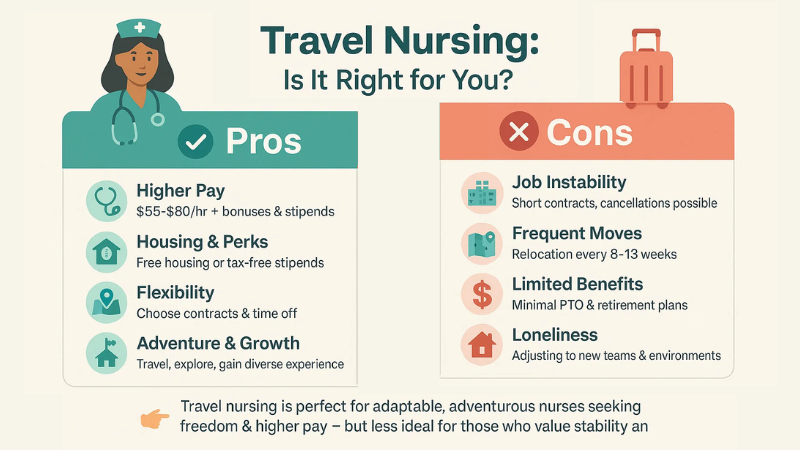
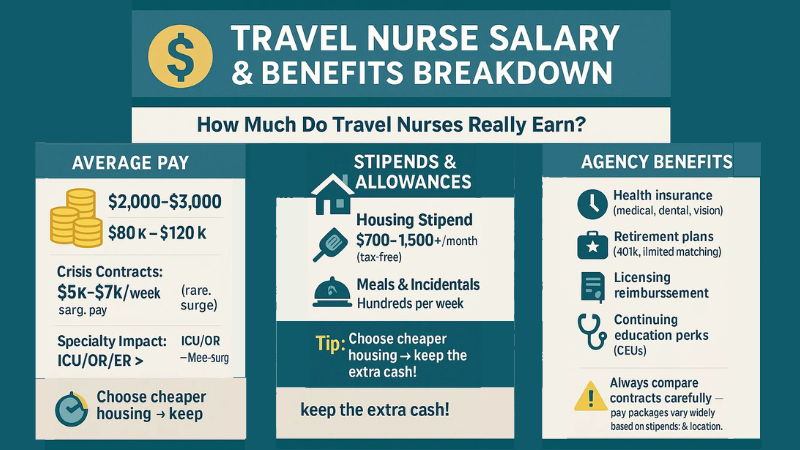
Leave a Reply